
Progress in Transplantation
Scope & Guideline
Leading the Charge in Transplantation Advancements
Introduction
Aims and Scopes
- Clinical Outcomes in Transplantation:
Research often emphasizes clinical outcomes post-transplant, including graft survival, rejection rates, and complications, providing insights into best practices for patient care. - Patient-Centered Care and Perspectives:
The journal prioritizes studies that explore patient experiences, decision-making processes, and quality of life, highlighting the importance of patient-centered approaches in transplantation. - Innovations in Transplantation Techniques and Protocols:
There is a consistent focus on novel surgical techniques, pharmacological advancements, and innovative protocols aimed at improving transplantation outcomes. - Healthcare Policy and Ethics in Transplantation:
The journal addresses ethical considerations, healthcare policies, and disparities in access to transplantation, aiming to influence policy and practice in the field. - Education and Training in Transplantation:
Studies on educational interventions for healthcare professionals and patients are common, emphasizing the need for improved training and knowledge dissemination in transplantation.
Trending and Emerging
- Digital Health Interventions:
There is a notable increase in research on the use of digital health technologies to support prehabilitation, education, and monitoring of transplant patients, indicating a shift towards integrating technology in patient care. - Cultural Competence and Patient Advocacy:
Emerging studies focus on culturally safe care and the voices of diverse patient populations, emphasizing the importance of understanding cultural backgrounds in improving transplantation outcomes. - Mental Health and Psychosocial Factors:
An increasing number of publications address the mental health and psychosocial aspects of transplantation, recognizing their critical role in overall patient outcomes and quality of life. - Healthcare Disparities and Access Issues:
Research exploring healthcare disparities, particularly among minority populations, has gained traction, highlighting the urgent need to address inequities in access to transplantation. - Long-Term Outcomes and Quality of Life:
There is a growing emphasis on long-term outcomes and quality of life after transplantation, reflecting a shift towards understanding the holistic impact of transplantation on patients' lives.
Declining or Waning
- Basic Science Research:
There appears to be a waning interest in purely basic science studies related to transplantation biology, with a shift towards more applied clinical research. - Single-Organ Focus:
Research that concentrates solely on individual organ transplantations (like kidney or liver alone) is decreasing, as there is a growing trend towards multidisciplinary approaches and integrated care models. - Transplantation in Non-Traditional Populations:
There is less emphasis on studies examining transplantation in non-traditional recipient populations (e.g., older adults or those with significant comorbidities), suggesting a potential gap in addressing diverse patient needs.
Similar Journals
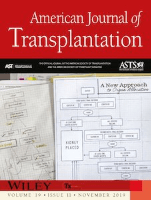
AMERICAN JOURNAL OF TRANSPLANTATION
Pioneering research in organ transplantation and immunology.American Journal of Transplantation, published by Elsevier Science Inc, is a premier academic journal dedicated to the critical field of transplantation. With an impressive impact factor and prestigious rankings in Immunology and Allergy, Pharmacology (medical), and Transplantation, it stands as a leading source of high-quality research in these domains, boasting a Q1 category status since 2023. The journal serves an essential role in advancing scientific knowledge and clinical practices, publishing cutting-edge studies that address pressing issues in organ transplantation and immunology. Researchers, healthcare professionals, and students will find valuable insights through rigorous peer-reviewed articles that focus on innovative methodologies, outcomes, and the latest developments within transplantation science. As the journal continues to evolve from its inception in 2001 to its ongoing contributions through 2024, it remains a key resource for those looking to stay at the forefront of transplantation research and practice.
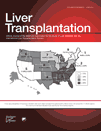
LIVER TRANSPLANTATION
Transforming Lives Through Innovative Liver Science.LIVER TRANSPLANTATION, published by Lippincott Williams & Wilkins, stands at the forefront of hepatology and transplantation research, with a prestigious Q1 rating across the categories of Hepatology, Surgery, and Transplantation as of 2023. Since its inception in 2000, this journal has been dedicated to disseminating high-quality, cutting-edge research that advances the understanding and practice of liver transplantation. With an impressive ranking of 23rd out of 551 in Surgery and 9th out of 54 in Transplantation, it occupies an esteemed position in the academic landscape, attracting contributions from leading experts in the field. The journal's rigorous peer-review process ensures the publication of impactful studies, innovative clinical practices, and vital insights into patient management. By fostering a collaborative environment for researchers, clinicians, and students alike, LIVER TRANSPLANTATION serves as an essential resource for those engaged in the complexities of liver transplantation and related fields. Join the community committed to advancing liver health and transplantation science.

NEPHROLOGY DIALYSIS TRANSPLANTATION
Exploring innovative solutions in dialysis and transplantation.NEPHROLOGY DIALYSIS TRANSPLANTATION is a premier academic journal published by Oxford University Press that plays a vital role in disseminating cutting-edge research within the fields of nephrology and transplantation. With an impressive impact factor and recognition as Q1 in both these categories for 2023, the journal ranks among the top publications in medicine, enhancing its visibility among a global audience of researchers, healthcare professionals, and students. Established in 1986, the journal has maintained a commitment to publishing high-quality, peer-reviewed articles that contribute to the advancement of knowledge and practice in renal medicine. Although this journal does not offer open access options, it remains a highly regarded resource due to its rigorous selection process and influential contributions to the field. Scholars are encouraged to explore the journal’s extensive archive, spanning from 1986 to 2024, for invaluable insights and developments in nephrology and transplantation.

Transplantation Direct
Fostering Global Insights in Transplantation MedicineTransplantation Direct is a leading open access journal in the field of transplantation, published by the prestigious Lippincott Williams & Wilkins. Since its inception in 2015, the journal has provided a vital platform for the dissemination of high-quality research and advancements related to organ transplantation. With an impact factor that places it in the Q2 category among transplantation journals, it ranks #22 out of 54 in the Medicine - Transplantation Scopus classification, reflecting its significance and authority within the discipline. The journal not only covers a broad scope of topics related to transplantation but also encourages global collaboration and knowledge exchange amongst researchers, clinicians, and students. With its open access model, Transplantation Direct ensures that groundbreaking findings are accessible to a wider audience, fostering innovation and enhancing patient care worldwide. For more information, visit their address at TWO COMMERCE SQ, 2001 MARKET ST, PHILADELPHIA, PA 19103.
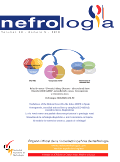
NEFROLOGIA
Exploring breakthroughs in renal science and practice.NEFROLOGIA is a preeminent scientific journal published by the SOCIEDAD ESPAÑOLA DE NEFROLOGÍA DR. RAFAEL MATESANZ, specializing in cutting-edge research and clinical advancements in the field of nephrology. Established in 1981 and continuing through 2024, this journal serves as a crucial platform for nephrologists, researchers, and healthcare professionals to disseminate knowledge and foster dialogue on critical issues affecting kidney health. With its ISSN 0211-6995 and E-ISSN 1989-2284, NEFROLOGIA is indexed in prestigious databases, ranking #35 out of 81 in the Scopus Medicine Nephrology category, reflecting its significance within the medical community. Although it does not currently offer open access, the journal ensures wide accessibility and readership through institutional subscriptions. Researchers and clinicians are invited to contribute their findings and reviews, advancing our understanding and treatment of renal diseases. Through its commitment to high scholarly standards and impactful research, NEFROLOGIA remains a vital resource for those dedicated to improving kidney care and advancing nephrology sciences.
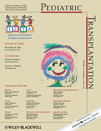
PEDIATRIC TRANSPLANTATION
Exploring groundbreaking insights in the realm of pediatric organ care.Pediatric Transplantation is a prestigious academic journal published by Wiley, focusing on the critical field of pediatric organ transplantation. Since its inception in 1997, the journal has played a pivotal role in disseminating groundbreaking research and clinical insights relevant to pediatric health, including both pediatrics and transplantation disciplines. With an impact factor that reflects its significance—ranking in the second quartile (Q2) within both Pediatrics, Perinatology and Child Health and Transplantation categories—it provides a vital platform for researchers and clinicians dedicated to improving outcomes for pediatric transplant patients. Pediatric Transplantation embraces a wide scope of studies, from basic science to clinical trials, promoting collaborations that enhance the well-being of young organ recipients. Published in the United Kingdom, this journal does not operate under an open access model, ensuring that the content is peer-reviewed and of the highest academic rigor. For professionals and scholars seeking to stay at the forefront of pediatric transplantation advancements, Pediatric Transplantation serves as an invaluable resource.
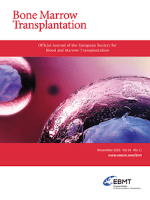
BONE MARROW TRANSPLANTATION
Elevating Standards in Hematology and Transplantation.BONE MARROW TRANSPLANTATION, published by SpringerNature, stands as a leading journal in the fields of Hematology and Transplantation, as evidenced by its recognition in the Q1 category for both disciplines according to 2023 rankings. With an impressive impact factor and notable Scopus rankings—7th out of 54 in Medicine Transplantation and 25th out of 137 in Medicine Hematology—this journal is instrumental for researchers and professionals dedicated to advancements in bone marrow transplantation practices and research. Established in 1986, the journal publishes original research, clinical studies, and reviews that push the boundaries of current knowledge, making it essential reading for those looking to stay abreast of the latest developments in the field. Although offering limited Open Access options, BONE MARROW TRANSPLANTATION reaches a broad audience and furthers a global dialogue on best practices and innovative approaches in transplantation medicine. Its address in London, UK positions it at the heart of international research collaboration, fostering connections among scientists, clinicians, and students alike.

International Journal of Organ Transplantation Medicine
Elevating Standards in Organ Transplantation KnowledgeThe International Journal of Organ Transplantation Medicine, published by the Avicenna Organ Transplant Center, stands as a vital resource for the field of transplantation medicine. Established to advance scientific knowledge and clinical practices, this open access journal has been supporting the global research community since 2010, ensuring that groundbreaking findings are easily accessible to researchers, professionals, and students alike. With its ISSN of 2008-6490 and E-ISSN 2008-6482, the journal consistently showcases high-quality, peer-reviewed articles, addressing critical advancements in transplantation techniques, patient care, and immunology. Renowned for its commitment to excellence, it holds a Q3 ranking in transplantation for 2023 and ranks #32 out of 54 in the Scopus medicine transplantation category, placing it in the 41st percentile. Researchers are encouraged to submit their work, contributing to the journal's goal of improving outcomes in organ transplantation and fostering collaboration across disciplines.
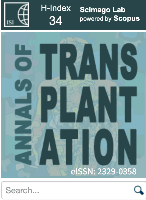
Annals of Transplantation
Shaping Tomorrow’s Transplantation Strategies TodayAnnals of Transplantation is a renowned academic journal published by INT SCIENTIFIC INFORMATION, INC, dedicated to the field of transplantation medicine. With a strong historical presence since its inception in 1996, this journal continues to provide a vital platform for disseminating innovative research, clinical studies, and review articles that contribute significantly to the ever-evolving landscape of organ transplantation. Holding a respectable Q2 ranking in the field of transplantation and a Q3 ranking in broader medicine categories as of 2023, the journal stands out with an impactful repository of knowledge that caters to a diverse audience, including researchers, healthcare professionals, and students. While it currently does not operate under an open access model, the scholarly contributions within are crucial for advancing practices, policies, and outcomes in transplantation. Whether you are seeking to keep abreast of recent advances or looking to publish your own findings, Annals of Transplantation serves as an essential resource for fostering collaboration and innovation in medical science.
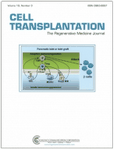
CELL TRANSPLANTATION
Exploring the future of cell and tissue therapies.CELL TRANSPLANTATION is a premier multidisciplinary journal dedicated to advancing the field of regenerative medicine and transplantation, published by SAGE PUBLICATIONS INC. Since its initiation in 1992 and embracing an open-access model since 2017, the journal aims to disseminate high-quality research that covers both clinical and experimental studies on cell and tissue transplantation. With a notable impact reflected in its 2023 Q2 ranking in Biomedical Engineering and significant standings in Cell Biology and Transplantation, CELL TRANSPLANTATION serves as a vital resource for researchers, practitioners, and students alike. The journal's commitment to fostering innovation is evident in its diverse contributions that address the complexities of tissue engineering, immunology, and regenerative therapies, inviting readers to engage with cutting-edge science that is poised to transform medical practices and improve patient outcomes. The journal's insightful articles and research findings make it a crucial platform for knowledge exchange within the vibrant scientific community.